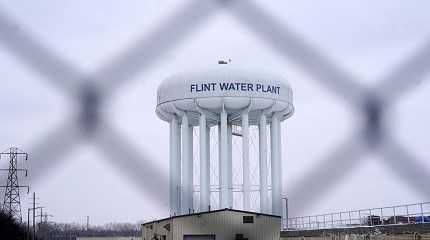
DETROIT (AP) — A judge declared a mistrial Thursday after jurors said they couldn’t reach a verdict in a dispute over whether two engineering firms should bear some responsibility for Flint’s lead-contaminated water.
Veolia North America and Lockwood, Andrews & Newman, known as LAN, were accused of not doing enough to get Flint to treat the highly corrosive water or to urge a return to a regional water supplier.
A mistrial was declared in federal court in Ann Arbor, Michigan, court spokesman David Ashenfelter said.
After hearing months of evidence, the jury began full deliberations on July 25 but also took a planned 11-day break before returning Tuesday.
The trial centered on the engineering firms and the effects of lead on four children, not all Flint residents. But the result was being closely watched because it would likely influence possible settlements or trials in other cases.
Veolia and LAN were not part of a landmark $626 million deal involving thousands of residents of the majority-Black city, the state of Michigan and other parties.
Citing cost, Flint managers appointed by then-Gov. Rick Snyder stopped using water from a Detroit agency and switched to the Flint River while awaiting a new pipeline to Lake Huron.
The water became contaminated in 2014-15 because water pulled from the river wasn’t treated to reduce the corrosive effect on lead pipes. The Michigan Civil Rights Commission said the contaminated water was the result of systemic racism in the city, doubting that the water switch and the brush-off of complaints would have occurred in a white, prosperous community.
During closing arguments, attorneys for the children argued that Veolia should be held 50% responsible for lead contamination and that LAN should be held 25% responsible, with public officials making up the balance.
But Veolia’s lawyers noted the firm was briefly hired in the middle of the crisis, not before the spigot was turned on. LAN said an engineer repeatedly recommended that Flint test the river water for weeks to determine what treatments would be necessary.
LAN attorney Wayne Mason said outside engineers were getting lumped in with a “platoon of bad actors,” namely state and local officials who controlled all major decisions and seemed more concerned about the cost of water than its quality.
Snyder was summoned as a witness but declined to answer questions, citing his right against self-incrimination. He was indicted on misdemeanor charges in a separate Flint water investigation, but the Michigan Supreme Court said the indictment was invalid. State prosecutors are trying to reinstate the charges.
The jury instead watched a video of Snyder’s 2020 interview with lawyers.
“I wish this never would have happened,” he said of the water mess, acknowledging mistakes by government.




